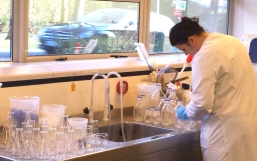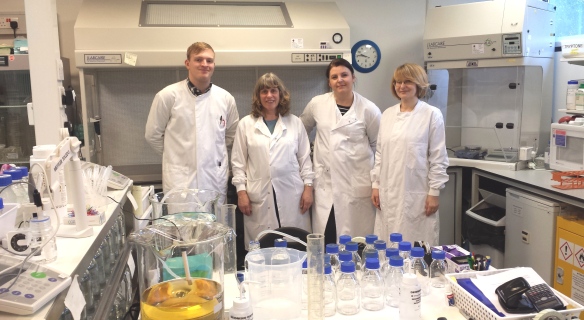The staff who work in our Unit fulfil a number of roles that ensure we are able to produce high quality, internationally competitive research that will improve human health. The lab management team provides round-the-clock support to our researchers to ensure that they are able to meet their research goals!
In part 1 of this Q&A post, we asked Lab Manager, Karen Hébert about the challenges and rewards of managing a Research Centre such as this. In part 2, we will delve further behind the scenes of the lab management team. Agata Sibirska, Laboratories Coordinator, and Christy Russell, Assistant Laboratory Manager, tell us about the services that are routinely provided to the Centre researchers and the support staff behind these services.
Q. So, it looks like there is a whole lab management team involved with the running of the Research Centre! What are the main services provided and who provides these?

Media, solutions and buffers ready for use!
A. The work of our teams provides essential support services to all our research activities. Thanks to our Media Technician and Glasswashers, the researchers can fully focus on science. Our team members, Edward Taylor, Mary Mingay and Agnieszka Mikolajewska, make sure that the researchers have everything they need, when they need it. The daily duties range from collecting, processing and redistributing clean plastics and glassware across all of the labs, to preparation of most solutions, buffers and culture media, as required by the research teams. We also keep shelved stock of common media and buffers readily available to scientists. Media and Glasswash also provide Autoclaving/Hot Air Sterilisation services.
Q. How did everyone get to these roles? Do you all have science backgrounds?
A. The team members came at different stages and with a variety of backgrounds. These range from working with leading commercial biotech companies, to recent university-graduates, to similar posts in other organisations. One thing everyone has in common is being attracted by the brand and prestige of the University of Cambridge. Not least important is working to support some of the world’s leading scientists and being a part of high quality research that will contribute towards the understanding of cancer.

Agnieszka prepares the glasswash items for the days research.
The work in the Media-Glasswash team has at times exceeded some expectations. For example, the work might appear to involve much repetition. However, after joining, our small team workers have discovered that we all have a variety of additional tasks to our main duties which makes the position much more flexible, interesting and variable.
Q. So what would a typical day look like here? In what way would you assist our researchers with the daily running of their experiments?

Edward prepares a range of media items, buffers and solutions to support the Unit’s extensive research activities!
A. The typical day begins with routine daily tasks collecting the glasswash items for processing, as well as preparing the required media and solutions. This might not sound like much, but we’re actually operating on quite a tight schedule to cope with the demand in a timely manner. In addition to the regular work, we also get bespoke requests that make the routine tasks so much more interesting. A variety of Media items are prepared and we pride ourselves that we can make anything, so long as it is not particularly hazardous. The most frequent items are: LB and 2xTY for growing bacteria, SOC medium for recovering bacteria after transfection with plasmid and LB agar plates with antibiotics for selecting clones of plasmid containing bacteria. TE is used for storing plasmids after purification and ultrapure water is used for many molecular biology reaction buffers. 50x TAE is a commonly used running buffer in agarose DNA gels. We can also make a variety of media for mammalian cell line culturing.
Q. These services are clearly critical to the smooth running of the daily research. What happens when things go wrong with these? Have you ever had to stop these services for any reason?

Glassware items ready for use.
A. We have not suffered any health and safety incidents. We pay a great deal of attention to training members of our team and this seems to be working very well. As you would expect though, at times we do experience some technical problems, breakdowns and other misadventures, resulting in spills, a little flooding or the need for a service call-out. This might not necessarily be directly related to our domain. For example, elevator breakdown impacts us severely as we need to find other ways of collecting and redistributing the processed plastics and glassware.
We are well prepared to deal with the minor everyday disasters and dedication, flexibility and creativity of our team has always allowed us to overcome adversities, but obviously these cases break our daily routine and do put additional pressure on the team. In recent years we have been specifically plagued by ever increasing problems with our 15 year-old autoclaves. Each time we experience a faulty run, the glasswash loads need to be rewashed and, depending on the kind of failure, the media in preparation may need to be discarded and prepared again. These cycle re-runs can negatively impact on the effectiveness of the Glasswash and Media team. In the case of complete breakdown, thanks to good relations with the neighbouring units, we have been able to share autoclave runs. These occasions put additional workload and stress on both our team and our neighbours’, but also demonstrate the value of excellent reciprocal working relationships with other local University departments. We look forward to replacing the autoclaves with modern models that will run effectively and much more efficiently, reducing not only the downtime we have experienced, but also saving a huge amount of water and power!
Q. Would researchers ever make specific requests for a set of experiments that they have been working on? Can you tell us about any of these?
A. Yes, it is quite common that we get specific requests from the researchers. They can order media and other solutions using request forms by providing a ‘recipe’ we can follow. Sometimes though, the recipe may produce unexpected results. Some of the ideas might look great on paper, but in practice can prove to be quite the opposite. For example, it looks like a great idea to make a very concentrated buffer, convenient for frequent use, but when we tried to deliver on this we learnt the hard way that an unfamiliar solution did not like to be made in higher concentration. Some trial and error – but at least we have learnt something new! If anything non-standard is required, the researchers can bring in a recipe to us and we can advise if it is possible to produce; we make a risk assessment and check availability of reagents.

The Media-Glasswash team are always on-hand to support the Centre’s research activities. From left to right: Edward Taylor, Mary Mingay, Agnieszka Mikolajewska and Agata Sibirska.
Following a research retreat including a visit to the University of Pavia, Italy, a colleague requested that we make up a silver stain based on the historically significant work of physiologist Camillo Golgi. This is perhaps the most unusual request we’ve ever had!
Q. From the last blog, we learnt that there have been a number of changes and additions made to the lab facilities. Have the lab services changed much over the years? If so, in what way and what demands has this placed on everyone?
A. One aspect of the work of the laboratory management team is to carry out Display Screen Equipment assessments (DSE) in line with HSE guidelines. Over the 15 years since the building opened, there has been a significant increase in usage of computers in laboratory work, particularly where confocal imaging and high throughput screening generate vast amounts of data that require detailed analyses. This work can result in researchers seated at their DSE for long periods of time increasing the risks of problem commonly known as Repetitive Strain Injury (RSI). By making minor changes to their working environments such as raising the height of a screen, providing a footrest or simply adjusting a chair to fit the differing shapes of individuals we are able to bring relief to DSE users suffering discomfort. The recent arrival of two Bioinformatics groups has dramatically increased the number of ‘heavy’ DSE users, further emphasizing the importance of the service we offer.
Q. Do you foresee any changes in the next few years? What do you think these might be and what challenges (if any) might they throw up?
A. The laboratory management team is responsible for the service and maintenance of the entire department’s research equipment. One of the biggest challenges we face is keeping pace with technological innovation. We have purchased a number of high value instruments in recent years, where the annual service costs are up to twenty thousand pounds per annum. In the case of our Mass Spectrometers this is not really surprising as you could purchase two starter homes for the price of the instrument! Our success in bidding for such high value instrumentation does leave us with a challenge though, as service costs are not included as part of a ‘capital’ equipment bid. The additional running costs therefore have to be absorbed by the department’s existing service budgets. This leads to difficult decisions regarding the coverage levels of all of our instrumentation. However, the Biomedical Campus provides us with opportunities to share equipment in order to reduce down time. Being part of the wider University family also gives us greater bargaining power when negotiating discounts with our suppliers. We are optimistic that we can continue to maximise our funds in this way, enabling us to purchase further starter homes or even Mass Spec machines!
